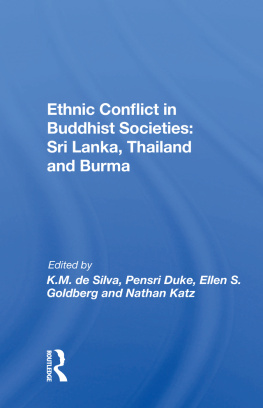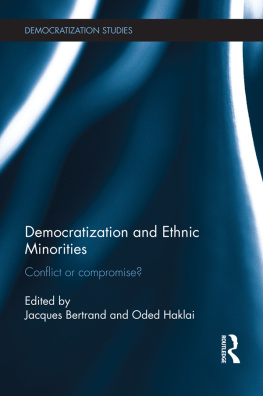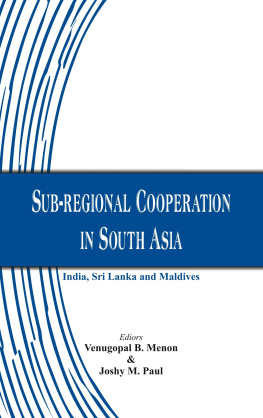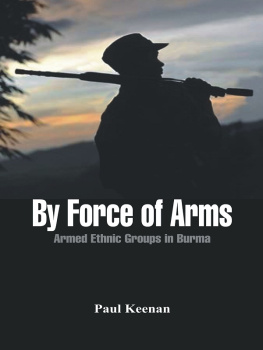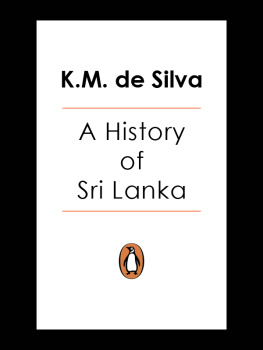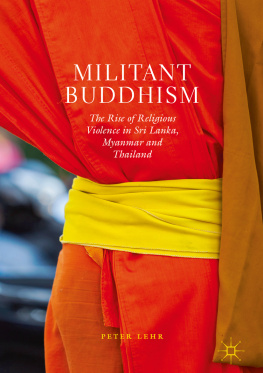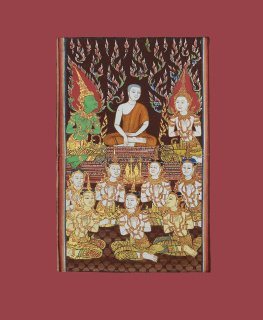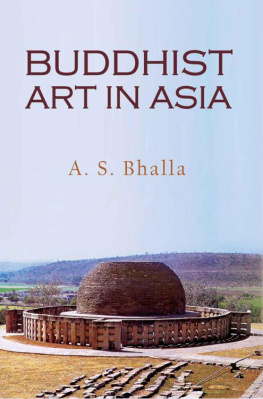Ethnic Conflict in Buddhist Societies
Ethnic Conflict in Buddhist Societies: Sri Lanka, Thailand and Burma
Edited by
K.M. de Silva , Pensri Duke , Ellen S. Goldberg and Nathan Katz
First published 1988 by Westview Press
Published 2018 by Routledge
52 Vanderbilt Avenue, New York, NY 10017
2 Park Square, Milton Park, Abingdon, Oxon OX14 4RN
Routledge is an imprint of the Taylor & Francis Group, an informa business
K.M. de Silva, Pensri Duke, Ellen S. Goldberg and Nathan Katz, 1988
All rights reserved. No part of this book may be reprinted or reproduced or utilised in any form or by any electronic, mechanical, or other means, now known or hereafter invented, including photocopying and recording, or in any information storage or retrieval system, without permission in writing from the publishers.
Notice:
Product or corporate names may be trademarks or registered trademarks, and are used only for identification and explanation without intent to infringe.
British Library Cataloguing in Publication Data
A CIP catalogue record for this book is available from the British Library
Library of Congress Cataloging in Publication Data
Applied for
Typeset by Associated Typsetters Ltd., Hong Kong.
ISBN 13: 978-0-367-00322-7 (hbk)
Contents
K.M. de Silva
Padmasiri de Silva
Chaiwat Satha-Anand
P.D. Premasiri
K.M. de Silva
Ronald D. Renard
Likhit Dhiravegin
K.N.O. Dharmadasa
Sanit Wongsprasert
Nathan Katz
S. W.R. de A. Samarasinghe
Trevor O. Ling
Surin Pitsuwan
K.M. de Silva
Guide
K.M. de Silva is Professor of Sri Lanka History at the University of Peradeniya, Sri Lanka, and Executive Director of the International Centre for Ethnic Studies, Kandy, Sri Lanka.
Padmasiri de Silva is Professor and Head of Philosophy at the University of Peradeniya, Sri Lanka.
Chaiwat Satha-Anand is Assistant Professor of Political Science and Associate Director of the Thai Khadi Research Institute at Thammasat University, Bangkok, Thailand.
P.D. Premasiri is Associate Professor of Philosophy at the University of Peradeniya, Sri Lanka.
Ronald D. Renard is Assistant to the President for External Relations at Payap University, Chiang Mai, Thailand.
Likhit Dhiravegin is a member of the Faculty of Political Science, Thammasat University, Bangkok, Thailand.
K.N.O. Dharmadasa is Associate Professor of Sinhala at the University of Peradeniya, Sri Lanka.
Sanit Wongsprasert is a social sciences researcher at the Tribal Research Institute, Chiang Mai, Thailand.
Nathan Katz is Associate Professor of Religious Studies at the University of South Florida, Tampa, and Editor of USF Monographs in Religion and Public Policy.
S.W.R. de A. Samarasinghe is Senior Lecturer in Economics at the University of Peradeniya, and Associate Director of the International Centre for Ethnic Studies, Kandy, Sri Lanka.
Trevor O. Ling is Emeritus Professor at Manchester University, England, and is affiliated with the Department of Sociology, National University of Singapore.
Surin Pitsuwan is Professor of Political Science at Thammasat University, Bangkok, Thailand.
This volume contains a selection of the papers presented at a South and South-east Asia regional workshop on 'Minorities in Buddhist Polities: Sri Lanka, Thailand and Burma', organised by the International Centre for Ethnic Studies (ICES), Sri Lanka, and the Thai Studies Programme of Chulalongkorn University, Thailand.
The tenor for 'Minorities in Buddhist Polities' was set by K. M. de Silva, Executive Director of ICES, in his keynote address. While the workshop would focus attention on policy-orientated issues and adopt a practical approach to ethnic conflict in the Buddhist societies examined, he stressed that religion and its impact on society and politics in these nations would be a central concern.
It was decided early in the workshop discussions that a selection of the papers presented should be published in book form. This was the first cross-national workshop in recent times on the theme of ethnic conflict and minority problems in the three main Theravada Buddhist societies in the world. Indeed, the issues involved have great importance at a time when ethnic tensions dominate the political life of many Third World nations, not to mention countries in the First and Second Worlds.
The editors had the unenviable task of making a choice of 15 out of more than 30 papers presented for inclusion in this volume. The choice was eventually determined by the need to prepare a manageable volume which would consider theoretical issues; Buddhism, minorities and public policy; Buddhist institutions and minorities; and case studies of minorities in Buddhist polities. In the preparation of this volume, the editors have had the unstinted co-operation and support of the ICES staff in Kandy. The editors wish to thank Miss Chalani Lokugamage and Miss Sepali Liyanamana for their hard work in preparing the typescript, Miss Nalini Weragama for her secretarial assistance, and Mrs Kanthi Gamage who devoted several hours of her time to checking the proofs.
Finally, the organisers of the seminar would like to express their gratitude to the various organisations which funded the workshop: the Ford Foundation, the Lee Foundation, the United Nations University in Tokyo, and the British Institute in South East Asia.
K.M. de Silva
The issue of minorities is complex and overdetermined, of necessity raising questions of nationalism, ethnicity, social ethics, minority rights, separatist movements, ecumenism, violence, counter-violence and terrorism. The interdisciplinary nature of the present volume was mandated by the subject-matter itself.
While policy issues are the main focus of this volume, some prior questions about the impact of religion on polities are also addressed, in particular how the Buddhist values of non-violence and a middle path of moderation impinge upon the ethnic crises which seem to dominate our contemporary world. Our specific concern is with ethnic conflict in the Buddhist societies of Sri Lanka, Thailand and Burma. In all three countries Buddhism is the dominant religion, and in all of them relations between the dominant majoritythe overwhelming majority in Thailand and Burma have ranged from unhappy and uncomfortable to decidedly hostile. All three are old societies with a long and troubled history, none longer and none more troubled than Sri Lanka, the smallest of the three.
In the three societies examined, religion and its impact on society and politics is a central concern. To what extent have Buddhist values acted as a restraint on ethnic violence? How does the 'middle path', the emphasis on moderation so crucially important in Buddhist teachings, translate into public policy and practical politics with regard to relations between Buddhists and the minorities in these three polities? Can Buddhism contribute to ethnic unity? These are some of the central issues discussed in this volume.
Texts and theories
This volume explores the attitude of Buddhism towards minorities according to canonical sources. P.D. Premasiri () shows that these contemporary exemplars of Buddhist tradition do not always expound the liberal attitudes of the canonical materials. In the discussions that ensued at the workshop on which this volume is based, it was felt that Buddhism as a religious tradition is composed of many layers: the canonical and post-canonical texts; the ascendency of Emperor Asoka in third-century BC India; the 'sacred charter' texts such as the Mahavamsa ; and popular religion with its syncretic Hindu, animist and folk elements. Understanding the impact of Buddhism upon ethnic crises entailed a view of Buddhism that included all aspects of the tradition.

